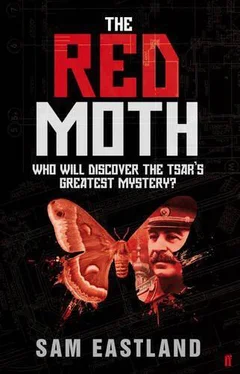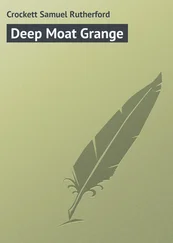Sam Eastland - Red Moth
Здесь есть возможность читать онлайн «Sam Eastland - Red Moth» весь текст электронной книги совершенно бесплатно (целиком полную версию без сокращений). В некоторых случаях можно слушать аудио, скачать через торрент в формате fb2 и присутствует краткое содержание. Жанр: Исторический детектив, на английском языке. Описание произведения, (предисловие) а так же отзывы посетителей доступны на портале библиотеки ЛибКат.
- Название:Red Moth
- Автор:
- Жанр:
- Год:неизвестен
- ISBN:нет данных
- Рейтинг книги:3 / 5. Голосов: 1
-
Избранное:Добавить в избранное
- Отзывы:
-
Ваша оценка:
- 60
- 1
- 2
- 3
- 4
- 5
Red Moth: краткое содержание, описание и аннотация
Предлагаем к чтению аннотацию, описание, краткое содержание или предисловие (зависит от того, что написал сам автор книги «Red Moth»). Если вы не нашли необходимую информацию о книге — напишите в комментариях, мы постараемся отыскать её.
Red Moth — читать онлайн бесплатно полную книгу (весь текст) целиком
Ниже представлен текст книги, разбитый по страницам. Система сохранения места последней прочитанной страницы, позволяет с удобством читать онлайн бесплатно книгу «Red Moth», без необходимости каждый раз заново искать на чём Вы остановились. Поставьте закладку, и сможете в любой момент перейти на страницу, на которой закончили чтение.
Интервал:
Закладка:
The distance across the gully was no more than ten paces. To support the bridge, heavy pilings had been set at an angle into either bank. The planks above were widely spaced and the wood bleached out by sun and snow and rain. Huge nail-heads looked like dull coins against the pilings, the wood around them dented by the blows of hammer strikes.
A breeze passed over the Rachel and dust sifted between the bridge planks. They blinked as it peppered their eyes. Above them, the steppe grass rustled with a sound like running water.
‘The truck is bound to be carrying an escort of armed guards,’ said Stefanov. ‘If we can stop them here, when the vehicle slows down to cross the bridge, it might give us an advantage. It’s too bad we can’t destroy the bridge before they reach it, but that would give away any hope of surprise.’
Pekkala handed over the grey canister. ‘Would this be enough for what you had in mind?’
Stefanov opened the lid of the canister and peered inside. Then he raised his head and looked at Pekkala. ‘Inspector,’ he gasped, ‘there is enough dynamite here to destroy this bridge and a dozen others like it!’
Immediately, they set to work. Pekkala scooped out some of the thick, dough-like mixture and packed it against two of the four main bridge supports. The marzipan smell of the mine’s Amytol explosives sifted into their lungs. Meanwhile, Stefanov unravelled the coil of wire for the instant fuse, the ignition battery stored safely in his pocket.
Once the charges had been laid, they dug out a space in the tall grass about twenty paces from the bridge, which was as far as the wire would stretch.
The whole process took less than half an hour, by the end of which the two men crouched sweating in their hiding place.
‘When this goes up, assuming we even survive the blast, your eardrums will hurt for a month,’ said Stefanov, as he hooked one wire to the negative battery terminal, saving the other, its filaments splayed like a skeleton hand, for connecting with the positive terminal.
Pekkala opened the black leather ammunition pouches on his belt and found that he had only three clips of bullets, fifteen rounds in all.
Stefanov fared better, with four magazines for the Schmeisser, each one containing thirty rounds, but it was no cause for celebration. Even that amount would soon disappear if they found themselves in a running battle with a squad of heavily armed soldiers.
There was nothing to do now but wait.
With fear and hunger scuttling like crabs behind their ribs, the two men lay hidden in the tall grass.
It was not long before the sound of engines reached them on the breeze. A minute later‚ an armoured car lumbered around a bend in the road. It was a type the Germans called a Lola. Riding on four large, heavy-treaded tyres, its sides were shielded with angled metal plates so that it resembled a monster folded out of paper by some Japanese origami master. On top was a small turret, almost flat, with a small cannon sticking out the length of a man’s outstretched arm. A soldier stood in the Lola’s turret, hands gripping the sides of the hatch covers. He wore an old style officer’s cap, its soft crown flattened against his head and turned around so that the visor was facing backwards. A pair of goggles shielded his eyes. From the eagle on his arm, instead of his chest, Pekkala knew the man was SS and not regular army.
A Hanomag truck followed in the Lola’s path, its canvas roof battened down tight. Judging from the way the wheel cowlings hung down over the tyres, the vehicle was carrying a heavy load.
Both machines rumbled slowly towards the bridge, diesel engines rattling in low gear.
While Pekkala drew back the bolt on his rifle to make sure that a round had been chambered, Stefanov took up the battery in one hand and gripped the loose wire in the other, ready to connect the circuit and detonate the explosives.
Pekkala had planned to destroy the bridge before the truck had a chance to cross it but the presence of the armoured car demanded more drastic action. Even though it would increase the risk, not only to Stefanov and himself, but also to the amber in the truck, Pekkala knew he had no choice.
Just short of the bridge, the armoured car slowed and then stopped. The trucks bunched up behind it, engines puttering in neutral.
The officer in the turret of the armoured car jumped down to the road and started walking towards the bridge.
Now the driver climbed out of the Hanomag. It was Gustav Engel wearing a knee-length double-breasted coat of the type normally issued to motorcycle drivers. Strapped to his waist on a black leather belt was a Luger holster. ‘This is the fourth time we’ve halted in the last hour!’ Engel raised his voice above the patient rumble of the engines. ‘We are running out of time!’
The SS officer spun around, one hand raised as if to cast a spell on the man who had broken his stride. ‘And this is the fourth time you have brought it to my attention, Professor!’
‘The train departs from Wilno at 4 p.m.,’ Engel told him. ‘Everything has to be loaded aboard by then. They will not wait for us. We must remain on schedule!’
‘I must inspect the bridge before we try to cross it,’ explained the officer. ‘I have to be certain that it will hold our weight.’
‘We don’t have time,’ said Engel. ‘The other bridges held us fine. I am ordering you to proceed immediately.’
The officer paused, ready to continue his protest, but then he seemed to think better of it, turned and strode back to the armoured car, footsteps soft as heartbeats on the dirt road. He climbed aboard, hobnails scraping on the metal plates. A moment later, the armoured car ground into gear and trundled forward.
Pekkala’s heart began flailing in his chest as he watched the armoured car move forward. The instant that its front wheels rolled on to the bridge, he whispered, ‘Now!’
Tyres thudded over the planks.
‘Now!’ he said again, staring helplessly as the Lola continued across the bridge.
‘I’ve already connected the battery,’ Stefanov replied frantically. ‘It should have gone off by now.’
In that moment, the mine exploded. A flash jumped from under the armoured car and a deafening boom shuddered through the air.
A wall of concussion swept past the two men in their hiding place as the Lola reared up and a blue flame, like the fire from a gas oven, swept around the metal. For a moment the whole machine was encased in this strange glow. Then the Lola exploded with a sound like the slamming of a huge metal door. Pieces of armour plating trailed sparks as they were torn loose by the blast. A wheel spun off, clattering and smoking, through the grass. Then the bridge collapsed. The Lola crashed into the gully. Dust and smoke unfurled into the sky.
At first, it looked as if Engel’s truck was going to follow the Lola into the Rachel. Then, with a shriek of brakes the vehicle came to a stop.
A man crawled out of the gully. It was the officer. His clothes were smouldering. One hand was held to his face. The other hand groped the air in front of him, as if he were pawing his way through cobwebs.
At the same time, the gate of the truck clanked down and three soldiers tumbled out, carrying their rifles. The soldiers looked about wildly, then dived into a shallow ditch at the side of the road.
The officer stumbled towards them, trailing smoke from his burned clothes.
One of the soldiers, unable to recognise the wounded man, raised his gun and fired.
A cloud of blood appeared behind the officer, lit up like a ruby shadow in the sunlight. He went down so fast that the spray was still hanging in the air after his body hit the ground.
A shout came from the soldiers as they realised their mistake, but it was soon drowned out by the clatter of Stefanov’s sub-machine gun and the single pak-pak-pak of rifle shots as Pekkala fired the Mauser, ejected an empty cartridge, slammed in a new one and pulled the trigger once again. Bullets skipped off the road in puffs of orange dirt.
Читать дальшеИнтервал:
Закладка:
Похожие книги на «Red Moth»
Представляем Вашему вниманию похожие книги на «Red Moth» списком для выбора. Мы отобрали схожую по названию и смыслу литературу в надежде предоставить читателям больше вариантов отыскать новые, интересные, ещё непрочитанные произведения.
Обсуждение, отзывы о книге «Red Moth» и просто собственные мнения читателей. Оставьте ваши комментарии, напишите, что Вы думаете о произведении, его смысле или главных героях. Укажите что конкретно понравилось, а что нет, и почему Вы так считаете.











